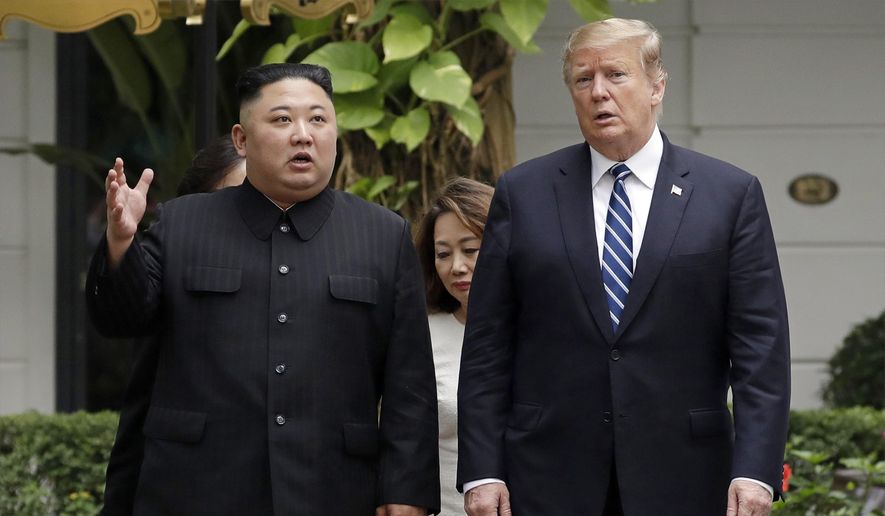President Trump and Kim Jong-un’s failure to reach an agreement in their second summit was “really bad news” for the North Korean leader, according to a former top State Department official who had a instrumental role in opening the current nuclear diplomacy with Pyongyang.
Mr. Trump’s decision at the Hanoi summit to reassert the U.S. position that “we cannot move on sanctions until there is much more progress on denuclearization” has altered the “power dynamics” going forward, says Ambassador Joseph Yun, who was U.S. special envoy on North Korea from 2016 to 2018.
“This is really bad news for Kim Jong-un,” Mr. Yun told reporters in a round-table discussion Friday at the U.S. Institute of Peace, where he’s an adviser. “The North Korean leader is not associated with failures. There is no failure in their vocabulary for the leader. So, very bad news for Kim Jong-un. It’s almost like he’s in time out, you know?”
“He’s stuck, doesn’t have any sanctions relief,” Mr. Yun said. “He doesn’t know where this is going. So, I think this really does change the power dynamics of negotiations.”
The comments came as North Korean state media, which refers to the nation by the acronym DPRK — Democratic People’s Republic of Korea — admitted for the first time Friday that the Feb. 28-29 summit in Hanoi had ended without an agreement.
After more than a week of general silence on the matter, Rodong Sinmun, the official newspaper of Mr. Kim’s ruling Workers’ Party, published a commentary Friday asserting that Washington was to blame for the fruitless meeting.
“The public at home and abroad that had hoped for success and good results from the second DPRK-U.S. summit in Hanoi are feeling regretful, blaming the U.S. for the summit that ended without an agreement,” said the commentary, according to several reports.
Reuters noted that Rodong went on to use fiery rhetoric toward Japan, accusing Tokyo of being “desperate to interrupt” relations between Pyongyang and Washington and of “applauding” the breakdown of the summit.
Japanese officials had expressed skepticism last week about the future of U.S.-North Korea diplomacy amid the current distance between the Trump administration and the Kim regime on the core matter of whether Pyongyang is prepared to abandon its nuclear weapons.
Mr. Trump so far has presented a hopeful message about future talks, although the diplomacy is struggling to keep its momentum amid reports of ongoing ballistic missile and nuclear activity in North Korea.
Mr. Yun told reporters Friday there is no question that Mr. Kim, who pushed for a commitment of some form of sanctions relief from Mr. Trump but left Hanoi in frustration.
“You know, he spent, what, 60 hours on the train riding down [from North Korea to Vietnam],” Mr. Yun said. “And then he had to spend two more days [after the summit] cooling his heels before riding back 60 hours. I mean, I certainly would not want to be his negotiator Kim Yong-chol or, you know, anyone else riding the train with him for 60 hours.”
Mr. Yun also suggested that the generally warm reception of Mr. Trump’s handling of the summit received from both sides of the political aisle in Washington may have added to the North Korean leader’s frustration.
As U.S. special envoy on North Korea at the start of the Trump administration, Mr. Yun is widely credited with having played an instrumental role in reopening the so-called New York channel to Pyongyang — a direct communication line with officials in the Kim regime — through which he helped secure the release of now-deceased American student Otto Warmbier, who had been held in North Korea for 15 months.
On a separate front Friday, Mr. Yun, also a former U.S. ambassador to Malaysia who served during the Obama era as principal deputy assistant secretary of state for East Asian and Pacific affairs, said the lack of an agreement in Hanoi likely frustrated South Korean President Moon Jae-in, who has been pushing for warmer relations with Pyongyang.
“This is also very bad news for Moon Jae-in. You know, he had really banked on getting something out of it to allow inter-Korean dialogue to deepen and this is a problem,” Mr. Yun said. “I think, on the day that the summit did not result in an agreement, the South Korean stock market fell by 2 percent, which seems, you know an overreaction.”
“I think for Japan, coming back to the traditional position is a good one,” he added. “I would imagine prime Minister Abe is pretty happy.”
“And then, China,” Mr. Yun said, “I think, you know, they’re more concentrated, obviously on the upcoming trade talks [with the Trump administration]. But I think this comes back to what they’ve been insisting to the U.S., which is, ’Washington, you’re not going to make immediate huge progress, so do what we say.’”
• Guy Taylor can be reached at gtaylor@washingtontimes.com.




Please read our comment policy before commenting.